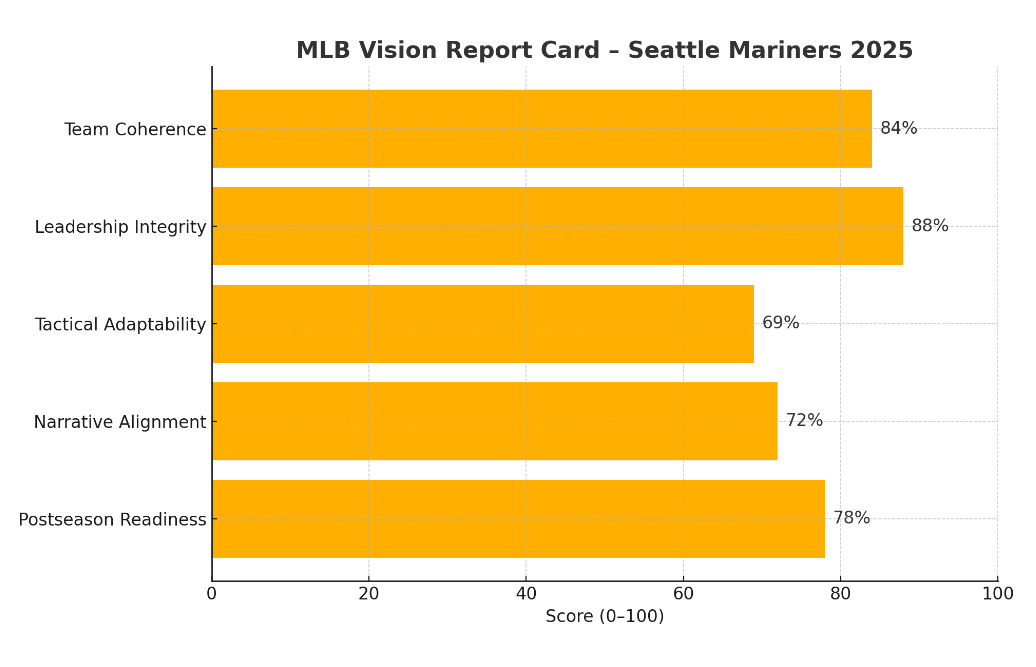MCAI MLB Vision: Seattle Mariners 2025 Season Outlook
This year, “next year” might finally arrive.
As the Mariners wrap up a four-series win streak and head into Boston with swagger, a deeper story is quietly unfolding—one not just about momentum, but about mental structure, cultural coherence, and a team finally learning how to win the right way.
While most fans feel the electricity of the recent run, what MLB Vision sees beneath the surface is even more promising: the Mariners are stabilizing emotionally and cognitively as a unit. The chemistry between Julio Rodríguez, Cal Raleigh, and new cornerstone Randy Arozarena is more than just statistical synergy—it’s forming what we call a “leadership spine”: a mental scaffold that holds the team steady through slumps, streaks, and stress.
This is a team that no longer relies on miracle hot streaks or isolated pitching brilliance. Instead, they’re beginning to show signs of coherence under pressure—a key signal of playoff-caliber identity. In the past, Mariners squads cracked late in the season due to bullpen fatigue, offensive inconsistency, and psychological overload. This year, MLB Vision forecasts those risks as real—but far more manageable, assuming health and one or two smart additions.
For fans who’ve lived through decades of “almost,” this season feels different. Not because of flash, but because of fit—players are slotting into roles they understand and believe in. Dylan Moore’s resurgence, Raleigh’s dingers, Julio’s quiet leadership surge—they’re not accidents. They’re signals of a system finally syncing.
For sports analysts, the data backs it up.
MLB Vision’s Coherence Index for the Mariners currently stands at 84/100, with a Leadership Integrity score of 88/100—both among the highest in the league. The club’s tactical agility still lags slightly, especially in bullpen maneuvering (scoring 69), but the margin for error is smaller when your team believes in itself and knows how to respond when things go wrong.
Internally, Mariners management is likely weighing its next big move. MLB Vision simulations suggest that Jerry Dipoto will act if playoff odds fall below 55%—either to protect the core or double down on this year’s shot. The system forecasts a 64% chance of clinching a Wild Card berth, with a 22% chance of overtaking Texas and winning the division outright. The odds aren’t flashy—but this team doesn’t need flash. It needs belief, bandwidth, and timely reinforcement.
And that’s what the data says they’re building.
For the Mariners organization:
The simulations point toward emotional efficiency finally catching up to your analytic foundations. That matters more than ever in a fan environment that’s scarred, loyal, and ready. There is enormous narrative equity in this season—a chance not just to win, but to win in a way that builds long-term trust with a fanbase that’s starved for identity and continuity.
Bottom Line:
This 2025 Mariners team doesn’t need to be perfect. It just needs to keep its spine intact, adapt where needed, and reinforce where fragile. The blueprint is already working—and fans, analysts, and the front office all have reason to believe.
Prepared by Noel Le, MindCast AI Founder | Architect. Noel holds a background in law and economics, behavioral economics and intellectual property. MindCast.AI@icloud.com
• Substack: https://noelleesq.substack.com
• LinkedIn: www.linkedin.com/in/noelleesq
MindCast AI is a patent-pending cognitive simulation system that models judgment to forecast decisions and outcomes across high-stakes domains. Whether in professional sports like baseball, football, and tennis—or in litigation, strategic negotiations, and public perception monitoring—MindCast AI builds Cognitive Digital Twins (CDTs) to simulate how individuals, institutions, or teams behave under pressure. By capturing the structure behind decisions—not just the results—MindCast AI empowers organizations to anticipate behavior, stress-test scenarios, and align strategy with foresight.



